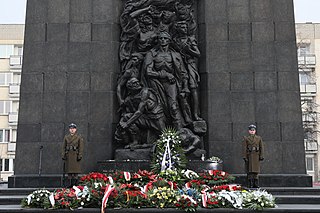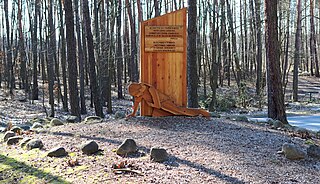
The Romani genocide or the Romani Holocaust—also known as the Porajmos, the Pharrajimos, and the Samudaripen —was the effort by Nazi Germany and its World War II allies to commit ethnic cleansing and eventually genocide against Europe's Romani people.

Yom Hazikaron laShoah ve-laG'vurah, known colloquially in Israel and abroad as Yom HaShoah and in English as Holocaust Remembrance Day, or Holocaust Day, is observed as Israel's day of commemoration for the approximately six million Jews who perished in the Holocaust as a result of the actions carried out by Nazi Germany and its collaborators, and for the Jewish resistance in that period. In Israel, it is a national memorial day. The first official commemorations took place in 1951, and the observance of the day was anchored in a law passed by the Knesset in 1959. It is held on the 27th of Nisan, unless the 27th would be adjacent to the Jewish Sabbath, in which case the date is shifted by a day.

The United States Holocaust Memorial Museum (USHMM) is the United States' official memorial to the Holocaust. Adjacent to the National Mall in Washington, D.C., the USHMM provides for the documentation, study, and interpretation of Holocaust history. It is dedicated to helping leaders and citizens of the world confront hatred, prevent genocide, promote human dignity, and strengthen democracy.

This is a selected bibliography and other resources for The Holocaust, including prominent primary sources, historical studies, notable survivor accounts and autobiographies, as well as other documentation and further hypotheses.

Holocaust Memorial Day is a national commemoration day in the United Kingdom dedicated to the remembrance of the Jews and others who suffered in the Holocaust, under Nazi persecution. It was first held in January 2001 and has been on the same date every year since. The chosen date is the anniversary of the liberation of Auschwitz concentration camp by the Soviet Union in 1945, the date also chosen for the International Holocaust Remembrance Day and some other national Holocaust Memorial Days.
On January 27, 2005 the United Nations General Assembly held a special session in remembrance of the liberation of the Auschwitz concentration camp on the same day of 1945. This is the first time that the international organization made a remembrance of victims of the Holocaust as a way to prevent futures genocides. Also, the General Assembly declared the day 27 of January as the International Day in Memory of the Victims of the Holocaust.

The Montreal Holocaust Museum is a museum located in Montreal, Quebec, Canada, that is dedicated to educating people of all ages and backgrounds about the Holocaust, while sensitizing the public to the universal perils of antisemitism, racism, hate and indifference. Through the museum, its commemorative programs and educational initiatives, it aims to promote respect for diversity and the sanctity of human life. The Museum was founded in 1979 as the Montreal Holocaust Memorial Centre and is Canada's first and only recognized Holocaust museum.

International Holocaust Remembrance Day is an international memorial day on 27 January that commemorates the victims of the Holocaust, the genocide of European Jews by Nazi Germany between 1941 and 1945. 27 January was chosen to commemorate the date that Auschwitz concentration camp was liberated by the Red Army in 1945.
United Nations General Assembly resolution 60/7 on Holocaust remembrance called for the establishment of a programme of outreach on the subject of the "Holocaust and the United Nations" and measures to mobilize civil society for Holocaust remembrance and education, in order to help to prevent future acts of genocide. Since its establishment by the Department of Public Information in January 2006, the Holocaust and the United Nations Outreach Programme has developed an international network of civil society groups and a multi-faceted programme that includes: innovative online educational products, youth outreach, DVDs, seminars and training programmes, a film series, book signings, a permanent exhibit at United Nations Headquarters in New York City, and the annual worldwide observance of the International Day of Commemoration in memory of the victims of the Holocaust.

The Auschwitz-Birkenau State Museum is a museum on the site of the Auschwitz concentration camp in Oświęcim, Poland.
The World Holocaust Forum is a series of events aimed at preserving the memory of the Holocaust. It is also known as the "Let My People Live!" Forum.

Black Ribbon Day, officially known in the European Union as the European Day of Remembrance for Victims of Stalinism and Nazism, is an international day of remembrance for victims of totalitarian regimes, specifically Stalinist, communist, Nazi and fascist regimes. Formally recognised by the European Union, the Organization for Security and Co-operation in Europe and a number of other countries, it is observed on 23 August and symbolizes the rejection of "extremism, intolerance and oppression". The purpose of the Day of Remembrance is to preserve the memory of the victims of mass deportations and exterminations, while promoting democratic values with the aim to reinforce peace and stability in Europe. It is one of the two official remembrance days or observances of the European Union, alongside Europe Day. Under the name Black Ribbon Day it is also an official remembrance day of Canada, the United States and other countries. The European Union has used both names alongside each other.

The Days of Remembrance of the Victims of the Holocaust (DRVH) is an annual 8-day period designated by the United States Congress for civic commemorations and special educational programs that help citizens remember and draw lessons from the Holocaust. The annual DRVH period normally begins on the Sunday before the Israeli observance of Yom HaShoah, Holocaust Memorial Day, and continues through the following Sunday, usually in April or May. A National Civic Commemoration is held in Washington, D.C., with state, city, and local ceremonies and programs held in most of the fifty states, and on U.S. military ships and stations around the world. The United States Holocaust Memorial Museum designates a theme for each year's programs, and provides materials to help support remembrance efforts.
The Documentation and Cultural Centre of German Sinti and Roma was established in Heidelberg, Germany, in the early 1990s, as a memorial to Sinti and Roma people who were killed by the National Socialists Party. After several years of extension work collecting stories from the victims, conducting research, and conversion, the building complex was ceremonially opened to the public on 16 March 1997, and was supported by the attendance of many Roma and Sinti survivors. It is the world's first permanent exhibition on the genocide perpetrated upon the Sinti and Roma by the Nazis. The documentation Centre has three levels and covers an area of almost 700 square meters, and traces the history and stories of the persecution of the Sinti and Roma under National Socialism. The institution is overseen by Central Council of German Sinti and Roma, supported by the city of Heidelberg, and is the beneficiary of special funds from the German Federal Government and the land of Baden-Württemberg.

Mémorial de la Shoah is the Holocaust museum in Paris, France. The memorial is in the district of Le Marais, in the third and fourth arrondissement, which had a large Jewish population at the beginning of World War II.

The first mass transport of Jews to Auschwitz concentration camp departed from Poprad transit camp in the Slovak State on 25 March 1942 and arrived at its destination on 26 March. It was the beginning of systematic deportation of Jews to Auschwitz concentration camp by the Reich Main Security Office and also the first transport of Jews from Slovakia.

On 27 January 1945, Auschwitz concentration camp—a Nazi concentration camp where more than a million people were murdered—was liberated by the Red Army during the Vistula–Oder Offensive. Although most of the prisoners had been forced onto a death march, about 7,000 had been left behind. The Soviet soldiers attempted to help the survivors and were shocked at the scale of Nazi crimes. The date is recognized as International Holocaust Remembrance Day.
Romi Cohn was a Czechoslovakian-born American rabbi, and real estate developer.

The Roma Holocaust Memorial Day on August 2 commemorates the victims of the Romani genocide (Porajmos) which was committed against the Romani people by Nazi Germany and its allies during World War II.












